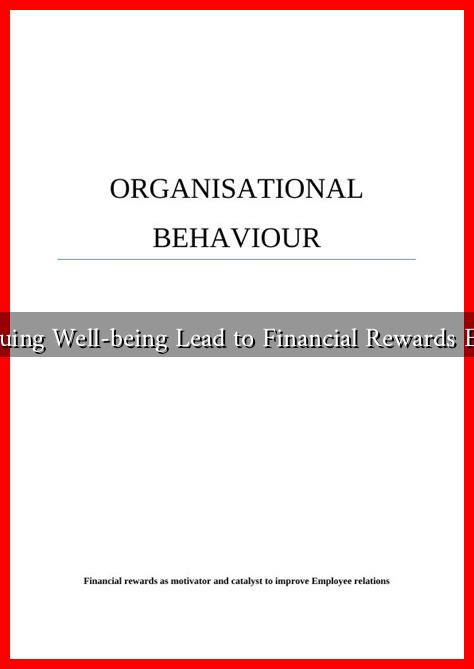-
Table of Contents
- Does Pursuing Well-being Lead to Financial Rewards Eventually?
- The Connection Between Well-being and Financial Success
- Case Studies: Organizations Reaping Financial Rewards
- Statistics Supporting the Financial Benefits of Well-being
- Personal Well-being and Financial Outcomes
- Conclusion: The Financial Payoff of Well-being
Does Pursuing Well-being Lead to Financial Rewards Eventually?
In today’s fast-paced world, the pursuit of well-being has become a focal point for many individuals and organizations. But does this pursuit translate into financial rewards? This article explores the intricate relationship between well-being and financial success, examining how investing in personal and organizational well-being can yield significant economic benefits.
The Connection Between Well-being and Financial Success
Well-being encompasses various dimensions, including physical health, mental health, emotional stability, and social connections. Research indicates that individuals who prioritize their well-being often experience enhanced productivity, creativity, and resilience, which can lead to financial gains. Here are some key points to consider:
- Increased Productivity: Employees who feel good about their work and personal lives tend to be more productive. A study by the University of Warwick found that happy employees are 12% more productive than their unhappy counterparts.
- Lower Healthcare Costs: Individuals who invest in their well-being often experience fewer health issues, leading to reduced healthcare costs. According to the American Psychological Association, companies that promote employee well-being can save up to $2.73 for every dollar spent on wellness programs.
- Enhanced Creativity: A positive mental state fosters creativity. Companies like Google and Zappos have implemented well-being initiatives that encourage creativity, resulting in innovative products and services that drive revenue.
Case Studies: Organizations Reaping Financial Rewards
Several organizations have successfully integrated well-being into their business models, leading to impressive financial outcomes. Here are a few notable examples:
- Salesforce: This cloud-based software company has invested heavily in employee well-being through initiatives like mental health days and wellness reimbursements. As a result, Salesforce reported a 25% increase in employee productivity and a significant boost in overall company performance.
- Johnson & Johnson: The healthcare giant has long recognized the importance of employee well-being. Their wellness programs have reportedly saved the company over $250 million in healthcare costs since 2002, demonstrating a clear financial return on investment.
- Google: Known for its employee-centric culture, Google offers various well-being programs, including fitness classes and mindfulness sessions. This commitment has led to lower turnover rates and higher employee satisfaction, ultimately contributing to the company’s financial success.
Statistics Supporting the Financial Benefits of Well-being
Numerous studies and statistics highlight the financial advantages of prioritizing well-being:
- A Gallup study found that organizations with high employee engagement levels experience 21% higher profitability.
- The World Health Organization estimates that for every $1 invested in mental health treatment, there is a return of $4 in improved health and productivity.
- According to a report by the Global Wellness Institute, the wellness economy is worth $4.5 trillion, indicating a growing market for well-being-related products and services.
Personal Well-being and Financial Outcomes
On an individual level, pursuing well-being can also lead to financial rewards. Here are some ways personal well-being can impact financial success:
- Better Decision-Making: Individuals who prioritize their mental and emotional health are more likely to make sound financial decisions, leading to better investment choices and savings.
- Networking Opportunities: A positive outlook and strong social connections can open doors to new job opportunities and collaborations, enhancing career prospects and income potential.
- Increased Resilience: Those who focus on well-being often develop resilience, enabling them to navigate financial setbacks more effectively and recover from economic challenges.
Conclusion: The Financial Payoff of Well-being
In conclusion, the pursuit of well-being is not merely a personal or organizational luxury; it is a strategic investment that can lead to substantial financial rewards. From increased productivity and creativity to lower healthcare costs and enhanced decision-making, the benefits of prioritizing well-being are clear. As more individuals and organizations recognize this connection, the potential for financial success through well-being initiatives will continue to grow.
Ultimately, fostering a culture of well-being can create a win-win situation: happier individuals and more profitable organizations. As we move forward, it is essential to embrace well-being as a fundamental component of financial strategy, ensuring a healthier, more prosperous future for all.
For further reading on the impact of well-being on financial success, you can explore resources from the Gallup Organization and the Global Wellness Institute.

